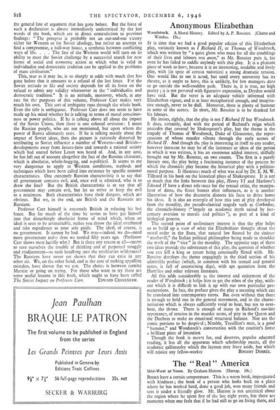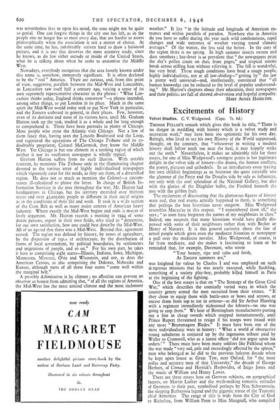The " Real " America
Mid-West at Noon. By Graham Hutton. (Harrap. 18s.)
BOOKS have a certain temperature. This is a warm book, impregnated with kindness ; the book of a person who looks back on a place where he has worked hard, done a good job, won many friends and sees it under a friendly glow. Mr. Hutton is not uncritical about the region where he spent five of the last eight years, but there are moments when one feels that if he had still to go on living there, and
was nevertheless free to open his mind, the tone might not be quite so genial. One can forgive things in the city one has left, as in the people one no longer has to meet every day, that are harder to assess philosophically when the association is not a matter of choice. At the same time, he has, indubitably, striven hard to draw a balanced picture, and it is one that deserves the most attentive study, since he knows, as do few either outside or inside of the United States, what he is talking about when he seeks to anatomise the Middle West.
Nowadays, everybody recognises that the area loosely known under this name is, somehow, immensely significant. It is often declared to be the " real " America. There are curious, and, from this point of view, suggestive, parallels between the Mid-West and Lancashire, as Lancashire saw itself half a century ago, voicing a sense of its own supremely representative character in the phrase: "What Lan- cashire thinks today, England thinks tomorrow "—a phrase intended, among other things, to put London in its place. Much in the same spirit the Mid-West would today seek to put New York in particular, and the Eastern seaboard in general, in their places. Few, however, even of its denizens and none of its visitors have, until Mr. Graham Hutton took up the task, studied it as a whole and for long enough to comprehend it. There have been portraits in plenty of Chicago. Most people who cross the Atlantic visit Chicago. Not a few of them fancy that, having seen the Lincoln Boulevard and the Loop, and registered the operations of The Chicago Tribune and its re- doubtable proprietor, Colonel McCormick, they know the Middle West. Yet Chicago is but one element in a teeming region of which neither it nor its vociferous newspaper is wholly typical. Graham Hutton suffers from no such illusion. With notable restraint, he mentions The Tribune only in the illuminating chapter devoted to the various array of highly individualised newspapers which vigorously cater for the needs, as they see them, of a diversified region. He does not so much as mention the Colonel—a circum- stance ill-calculated to please the latter. In charge of British In- formation Services in the area throughout the war, Mr. Hutton had headquarters in Chicago, but his territory extended over thirteen states and over 43,000,000 people as different in their racial origins as in the conditions of their life and work. It took in a wide section of the Corn Belt as well as many major centres of American heavy industry. Where exactly the Mid-West begins and ends is master of lively argument. Mr. Hutton records a meeting in 1944 of some dozen persons, expert in their own fields, who tried to "determine, for our own satisfaction, how one could best describe the Mid-West. All of us agreed that there was a Mid-West. Beyond that, agreement ceased. The region was defined by history, by zones of agriculture, by the dispersion of typcs of architecture, by the distribution of forms of local government, by political boundaries, by settlements and migrations of people, and so on." For his own part, he takes it here as comprising eight states—Illinois, Indiana, Iowa, Michigan, Minnesota, Missouri, Ohio and Wisconsin, and not, as does the American Census, as also comprising the Dakotas, Nebraska and Kansas, although parts of all these four states "come well within the marginal belt."
A possible delimitation is by climate ; no affection can prevent an observer so honest from admitting that, "of all the regions of America, the Mid-West has the most unkind -climate and the most inclement
weather." It lies "in the latitude and longitude of American ex- tremes and within parallels of paradox. Nowhere else in America do you have to suffer during the year such wild combinations, rapid changes and wide extremes of weather varying round climatic averages." Of the winter, the less said the better. In the core of the region there is no spring. In high summer insects swarm and dust smothers ; hay-fever is so prevalent that "the newspapers print the day's pollen count on theii front pages," and tropical storms break across stifling heat without relieving it. The fall is wonderful, but very brief. These tough conditions have bred a tough people, highly individualistic, not at all law-abiding—" getting by" the law is pretty well universal—and, intellectually, convinced that "all human knowedge can be reduced to the level of popular understand- ing." Mr. Hutton's chapters about their education, their newspapers and their politics are full of shrewd observation and hopeful sympathy.
MARY AGNES HAMILTON.



































 Previous page
Previous page